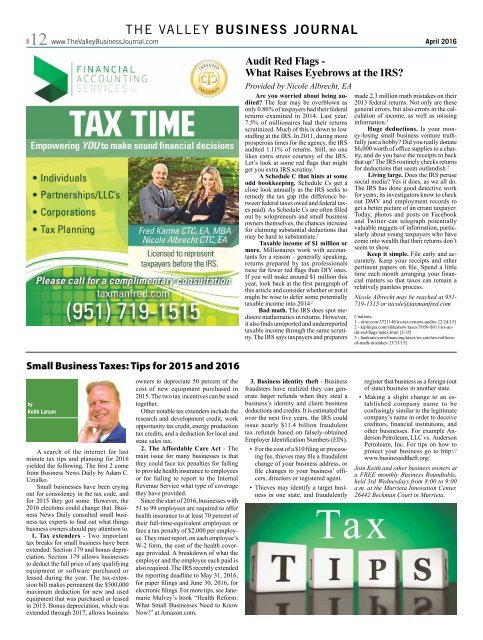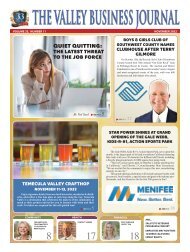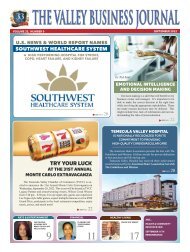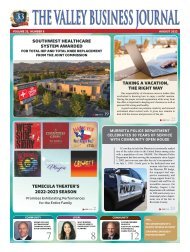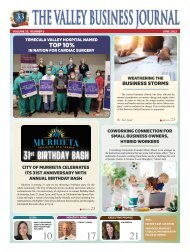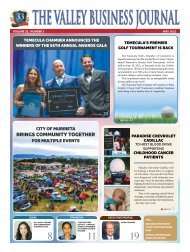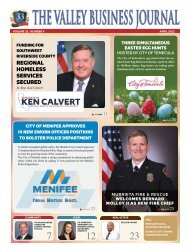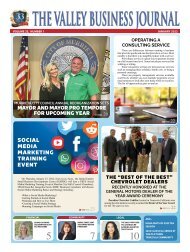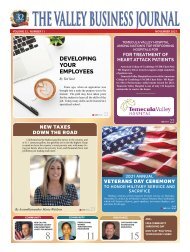You also want an ePaper? Increase the reach of your titles
YUMPU automatically turns print PDFs into web optimized ePapers that Google loves.
THE VALLEY BUSINESS JOURNAL<br />
12 www.TheValleyBusinessJournal.com<br />
<strong>April</strong> <strong>2016</strong><br />
Small Business Taxes: Tips for 2015 and <strong>2016</strong><br />
Audit Red Flags -<br />
What Raises Eyebrows at the IRS?<br />
Provided by Nicole Albrecht, EA<br />
Are you worried about being audited?<br />
The fear may be overblown as<br />
only 0.86% of taxpayers had their federal<br />
returns examined in 2014. Last year,<br />
7.5% of millionaires had their returns<br />
scrutinized. Much of this is down to low<br />
staffing at the IRS. In 2011, during more<br />
prosperous times for the agency, the IRS<br />
audited 1.11% of returns. Still, no one<br />
likes extra stress courtesy of the IRS.<br />
Let’s look at some red flags that might<br />
get you extra IRS scrutiny. 1<br />
A Schedule C that hints at some<br />
odd bookkeeping. Schedule Cs get a<br />
close look annually as the IRS seeks to<br />
remedy the tax gap (the difference between<br />
federal taxes owed and federal taxes<br />
paid). As Schedule Cs are often filled<br />
out by solopreneurs and small business<br />
owners themselves, the chances increase<br />
for claiming substantial deductions that<br />
may be hard to substantiate. 2<br />
Taxable income of $1 million or<br />
more. Millionaires work with accountants<br />
for a reason – generally speaking,<br />
returns prepared by tax professionals<br />
raise far fewer red flags than DIY ones.<br />
If you will make around $1 million this<br />
year, look back at the first paragraph of<br />
this article and consider whether or not it<br />
might be wise to defer some potentially<br />
taxable income into 2014 .2<br />
Bad math. The IRS does spot mediocre<br />
mathematics in returns. However,<br />
it also finds unreported and underreported<br />
taxable income through the same scrutiny.<br />
The IRS says taxpayers and preparers<br />
made 2.3 million math mistakes on their<br />
2013 federal returns. Not only are these<br />
general errors, but also errors in the calculation<br />
of income, as well as missing<br />
information. 3<br />
Huge deductions. Is your money-losing<br />
small business venture truthfully<br />
just a hobby? Did you really donate<br />
$6,000 worth of office supplies to a charity,<br />
and do you have the receipts to back<br />
that up? The IRS routinely checks returns<br />
for deductions that seem outlandish. 2<br />
Living large. Does the IRS peruse<br />
social media? Yes it does, as we all do.<br />
The IRS has done good detective work<br />
for years; its investigators know to check<br />
out DMV and employment records to<br />
get a better picture of an errant taxpayer.<br />
Today, photos and posts on Facebook<br />
and Twitter can telegraph potentially<br />
valuable nuggets of information, particularly<br />
about young taxpayers who have<br />
come into wealth that their returns don’t<br />
seem to show.<br />
Keep it simple. File early and accurately.<br />
Keep your receipts and other<br />
pertinent papers on file. Spend a little<br />
time each month arranging your financial<br />
matters so that taxes can remain a<br />
relatively painless process.<br />
Nicole Albrecht may be reached at 951-<br />
719-1515 or nicole@taxmanfred.com<br />
Citations.<br />
1 - time.com/3721148/irs-tax-returns-audits/ [2/24/15]<br />
2 - kiplinger.com/slideshow/taxes/T056-S011-irs-audit-red-flags/index.html<br />
[3/15]<br />
3 - bankrate.com/financing/taxes/irs-catches-millionsof-math-mistakes/<br />
[3/31/15]<br />
by<br />
Keith Larson<br />
A search of the internet for last<br />
minute tax tips and planning for <strong>2016</strong><br />
yielded the following. The first 2 come<br />
from Business News Daily by Adam C.<br />
Uzialko.<br />
Small businesses have been crying<br />
out for consistency in the tax code, and<br />
for 2015 they got some. However, the<br />
<strong>2016</strong> elections could change that. Business<br />
News Daily consulted small business<br />
tax experts to find out what things<br />
business owners should pay attention to.<br />
1. Tax extenders - Two important<br />
tax breaks for small business have been<br />
extended: Section 179 and bonus depreciation.<br />
Section 179 allows businesses<br />
to deduct the full price of any qualifying<br />
equipment or software purchased or<br />
leased during the year. The tax-extension<br />
bill makes permanent the $500,000<br />
maximum deduction for new and used<br />
equipment that was purchased or leased<br />
in 2015. Bonus depreciation, which was<br />
extended through 2017, allows business<br />
owners to depreciate 50 percent of the<br />
cost of new equipment purchased in<br />
2015. The two tax incentives can be used<br />
together.<br />
Other notable tax extenders include the<br />
research and development credit, work<br />
opportunity tax credit, energy production<br />
tax credits, and a deduction for local and<br />
state sales tax.<br />
2. The Affordable Care Act - The<br />
main issue for many businesses is that<br />
they could face tax penalties for failing<br />
to provide health insurance to employees<br />
or for failing to report to the Internal<br />
Revenue Service what type of coverage<br />
they have provided.<br />
Since the start of <strong>2016</strong>, businesses with<br />
51 to 99 employees are required to offer<br />
health insurance to at least 70 percent of<br />
their full-time-equivalent employees or<br />
face a tax penalty of $2,000 per employee.<br />
They must report, on each employee’s<br />
W-2 form, the cost of the health coverage<br />
provided. A breakdown of what the<br />
employer and the employee each paid is<br />
also required. The IRS recently extended<br />
the reporting deadline to May 31, <strong>2016</strong>,<br />
for paper filings and June 30, <strong>2016</strong>, for<br />
electronic filings. For more tips, see Janemarie<br />
Mulvey’s book “Health Reform:<br />
What Small Businesses Need to Know<br />
Now!” at Amazon.com.<br />
3. Business identity theft - Business<br />
fraudsters have realized they can generate<br />
larger refunds when they steal a<br />
business’s identity and claim business<br />
deductions and credits. It is estimated that<br />
over the next five years, the IRS could<br />
issue nearly $11.4 billion fraudulent<br />
tax refunds based on falsely-obtained<br />
Employer Identification Numbers (EIN).<br />
• For the cost of a $10 filing or processing<br />
fee, thieves may file a fraudulent<br />
change of your business address, or<br />
file changes to your business’ officers,<br />
directors or registered agent.<br />
• Thieves may identify a target business<br />
in one state, and fraudulently<br />
register that business as a foreign (out<br />
of state) business in another state.<br />
• Making a slight change to an established<br />
company name to be<br />
confusingly similar to the legitimate<br />
company’s name in order to deceive<br />
creditors, financial institutions, and<br />
other businesses. For example Anderson<br />
Petroleum, LLC vs. Anderson<br />
Petroleum, Inc. For tips on how to<br />
protect your business go to http://<br />
www.businessidtheft.org/<br />
Join Keith and other business owners at<br />
a FREE monthly Business Roundtable,<br />
held 3rd Wednesdays from 8:00 to 9:00<br />
a.m. at the Murrieta Innovation Center,<br />
26442 Beckman Court in Murrieta.


